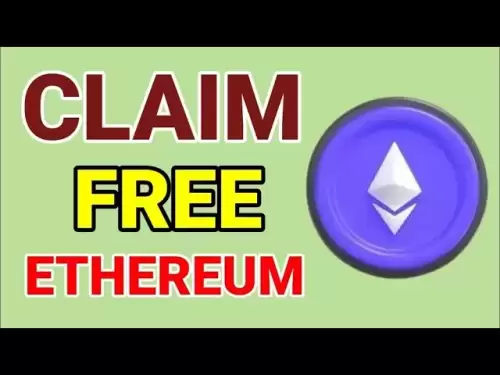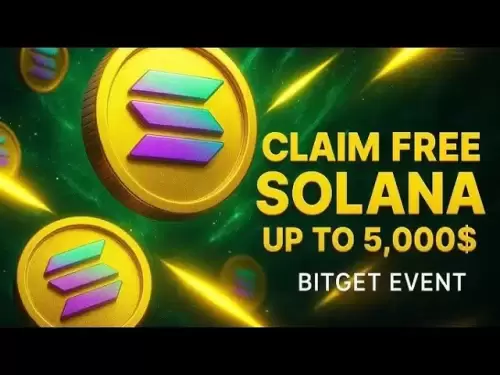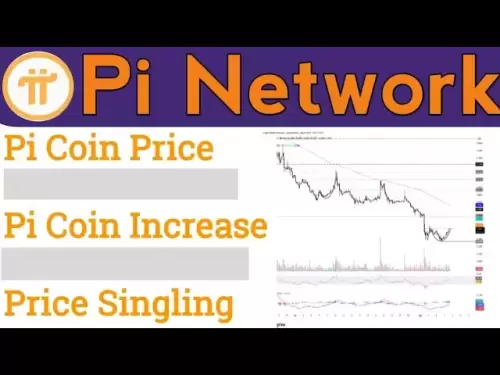-
 Bitcoin
Bitcoin $118300
1.01% -
 Ethereum
Ethereum $4215
0.69% -
 XRP
XRP $3.198
-3.83% -
 Tether USDt
Tether USDt $1.000
-0.01% -
 BNB
BNB $803.4
-0.53% -
 Solana
Solana $180.3
-0.67% -
 USDC
USDC $0.9998
-0.01% -
 Dogecoin
Dogecoin $0.2334
-1.49% -
 TRON
TRON $0.3394
0.86% -
 Cardano
Cardano $0.7980
-1.45% -
 Chainlink
Chainlink $22.19
6.65% -
 Hyperliquid
Hyperliquid $43.41
0.13% -
 Stellar
Stellar $0.4407
-3.13% -
 Sui
Sui $3.843
-2.24% -
 Bitcoin Cash
Bitcoin Cash $564.7
-3.74% -
 Hedera
Hedera $0.2588
-3.41% -
 Ethena USDe
Ethena USDe $1.001
0.00% -
 Avalanche
Avalanche $23.64
-3.37% -
 Litecoin
Litecoin $120.0
-4.01% -
 Toncoin
Toncoin $3.342
-1.11% -
 UNUS SED LEO
UNUS SED LEO $9.038
0.60% -
 Shiba Inu
Shiba Inu $0.00001347
-0.81% -
 Uniswap
Uniswap $10.69
-4.58% -
 Polkadot
Polkadot $4.034
-1.30% -
 Dai
Dai $1.000
0.01% -
 Bitget Token
Bitget Token $4.472
-1.52% -
 Cronos
Cronos $0.1571
-3.04% -
 Pepe
Pepe $0.00001207
-2.21% -
 Monero
Monero $273.8
-3.19% -
 Ethena
Ethena $0.7520
2.75%
How is the ecosystem of ADA developed?
Cardano's ecosystem thrives on peer-reviewed research, a multi-stage development process, and a vibrant community building dApps using Plutus and Marlowe, all guided by a decentralized governance model.
Mar 05, 2025 at 11:30 am

Key Points:
- Cardano's ecosystem development relies heavily on its peer-reviewed research and a multi-stage development process.
- A vibrant community of developers contributes to the ecosystem through various initiatives and tools.
- The Plutus smart contract platform and Marlowe for financial applications are key components driving development.
- Decentralized applications (dApps) are built on Cardano, expanding its utility and attracting users.
- Cardano's governance model allows for community input shaping the ecosystem's future.
How is the Ecosystem of ADA Developed?
Cardano's ecosystem development isn't a haphazard process; it's meticulously planned and executed, prioritizing rigorous academic research and community involvement. The foundation lies in its peer-reviewed scientific approach, ensuring a robust and secure platform. This contrasts sharply with many other cryptocurrencies that prioritize speed over stability. The development isn't solely driven by a centralized entity; it embraces a decentralized ethos.
The development of Cardano's ecosystem is a multi-stage process. First, thorough research and development occur, ensuring the underlying technology is sound and scalable. Then, developers build tools and infrastructure. Following this, dApps are created on top of the platform, expanding its functionality and usability. Finally, community engagement and governance play a crucial role in shaping the ecosystem's future.
The Plutus smart contract platform is a core component of Cardano's ecosystem. Plutus allows developers to build complex decentralized applications (dApps) on the Cardano blockchain. This opens up a vast array of possibilities, from decentralized finance (DeFi) applications to supply chain management solutions. Its functional programming language enhances security and predictability, which are essential for a stable and reliable platform.
Another crucial element is Marlowe, a domain-specific language specifically designed for building financial applications on Cardano. Marlowe simplifies the development process for financial contracts, making it more accessible to developers who may not be experts in blockchain technology. This specialized tool enhances the creation of DeFi applications, further enriching the Cardano ecosystem.
The Cardano ecosystem thrives on the contributions of its vibrant community. Numerous developers, researchers, and enthusiasts contribute to the project's growth. This community actively participates in various initiatives, such as hackathons, bug bounty programs, and open-source development. Their collective efforts drive innovation and expansion of the ecosystem. This active community participation ensures that Cardano remains responsive to evolving user needs and technological advancements.
Cardano's governance model also plays a crucial role in ecosystem development. The community has a say in the direction of the project through its stake-based governance system. This allows for a democratic and decentralized approach to decision-making, fostering transparency and accountability. This participatory governance ensures that the ecosystem evolves according to the collective will of its users and stakeholders.
The development of the Cardano ecosystem also includes the creation of various developer tools and resources. These resources are essential for making development easier and more efficient. The Cardano Foundation actively supports the development community by providing documentation, tutorials, and support channels. The availability of robust tools encourages more developers to build on Cardano, fostering a positive feedback loop.
Beyond smart contracts and DeFi, the ecosystem is expanding into other areas. We are seeing increased activity in NFTs, decentralized exchanges (DEXs), and various other applications. This diversification strengthens the ecosystem's resilience and reduces reliance on a single application category. The ongoing development efforts aim to make Cardano a truly comprehensive blockchain platform.
The ongoing development of Cardano's ecosystem is driven by a combination of factors. These include a strong emphasis on academic research, a dedicated development community, a robust set of tools and resources, and a democratic governance model. All of these elements work in synergy to propel the growth and evolution of the Cardano ecosystem. Continuous improvement and adaptation are key to the long-term success of the platform.
The ecosystem's expansion is not solely limited to technological advancements; it also involves expanding its reach and adoption. The Cardano Foundation actively works on partnerships and collaborations with various organizations to increase awareness and adoption of the platform. This includes collaborations with educational institutions, businesses, and governments.
Furthermore, the development of Cardano's ecosystem includes addressing scalability challenges. The platform is continuously improved to handle a growing number of transactions and users. This involves implementing innovative solutions and optimizing existing infrastructure. This constant work on scalability is crucial for ensuring the long-term sustainability of the platform.
The security of the Cardano ecosystem is a paramount concern. Rigorous security audits and testing are conducted regularly to identify and address potential vulnerabilities. The emphasis on security helps maintain trust and confidence in the platform. This focus on security is critical for maintaining the integrity of the entire ecosystem.
Frequently Asked Questions:
Q: What are the main programming languages used for developing on Cardano?
A: Plutus, a functional programming language, is primarily used for building smart contracts. Marlowe, a domain-specific language, simplifies the creation of financial applications on the platform.
Q: How can I contribute to the development of the Cardano ecosystem?
A: You can contribute by participating in open-source projects, attending hackathons, reporting bugs, providing feedback, or even becoming a developer and building dApps on the platform.
Q: What are the key advantages of developing on Cardano?
A: Key advantages include its peer-reviewed research foundation, a robust and secure platform, a supportive community, and a clearly defined governance model.
Q: What are some examples of dApps built on Cardano?
A: Numerous dApps are emerging across DeFi, NFTs, and other sectors. Specific examples are constantly evolving, so it's best to check the Cardano ecosystem's official resources for the most up-to-date list.
Q: Is Cardano's ecosystem truly decentralized?
A: Cardano strives for decentralization through its stake-based governance system and community involvement. However, the level of decentralization is an ongoing process and subject to continuous improvement.
Disclaimer:info@kdj.com
The information provided is not trading advice. kdj.com does not assume any responsibility for any investments made based on the information provided in this article. Cryptocurrencies are highly volatile and it is highly recommended that you invest with caution after thorough research!
If you believe that the content used on this website infringes your copyright, please contact us immediately (info@kdj.com) and we will delete it promptly.
- Dogwifhat's Comeback: Solana Meme Coin Mania and Beyond!
- 2025-08-10 18:30:15
- Shiba Inu Price Drop Alert: Can Google AI Predict the Future?
- 2025-08-10 18:30:15
- NEAR Protocol Rebound: Eyes on $4.63 as Bullish Momentum Builds
- 2025-08-10 17:30:13
- Bitcoin Cash Halving: Will the Price Fall or Fly?
- 2025-08-10 17:30:13
- Uniswap (UNI) Under Bearish Pressure: A Technical Analysis Deep Dive
- 2025-08-10 17:30:15
- DOT Price on the Rise: Polkadot's Bullish Momentum Heats Up!
- 2025-08-10 17:30:15
Related knowledge

How to purchase Aragon (ANT)?
Aug 09,2025 at 11:56pm
Understanding Aragon (ANT) and Its PurposeAragon (ANT) is a decentralized governance token that powers the Aragon Network, a platform built on the Eth...

What is the most secure way to buy Ocean Protocol (OCEAN)?
Aug 10,2025 at 01:01pm
Understanding Ocean Protocol (OCEAN) and Its EcosystemOcean Protocol (OCEAN) is a decentralized data exchange platform built on blockchain technology,...

Where can I buy UMA (UMA)?
Aug 07,2025 at 06:42pm
Understanding UMA and Its Role in Decentralized FinanceUMA (Universal Market Access) is an Ethereum-based decentralized finance (DeFi) protocol design...

How to buy Storj (STORJ) tokens?
Aug 09,2025 at 07:28am
Understanding Storj (STORJ) and Its Role in Decentralized StorageStorj is a decentralized cloud storage platform that leverages blockchain technology ...

What is the best app to buy Nano (NANO)?
Aug 09,2025 at 03:35am
Understanding Nano (NANO) and Its Unique FeaturesNano is a feeless, instant cryptocurrency designed for fast peer-to-peer transactions. Unlike many ot...

Where can I purchase Siacoin (SC)?
Aug 08,2025 at 11:14am
Understanding Siacoin (SC) and Its Role in the Sia NetworkSiacoin (SC) is the native cryptocurrency of the Sia decentralized cloud storage platform, a...

How to purchase Aragon (ANT)?
Aug 09,2025 at 11:56pm
Understanding Aragon (ANT) and Its PurposeAragon (ANT) is a decentralized governance token that powers the Aragon Network, a platform built on the Eth...

What is the most secure way to buy Ocean Protocol (OCEAN)?
Aug 10,2025 at 01:01pm
Understanding Ocean Protocol (OCEAN) and Its EcosystemOcean Protocol (OCEAN) is a decentralized data exchange platform built on blockchain technology,...

Where can I buy UMA (UMA)?
Aug 07,2025 at 06:42pm
Understanding UMA and Its Role in Decentralized FinanceUMA (Universal Market Access) is an Ethereum-based decentralized finance (DeFi) protocol design...

How to buy Storj (STORJ) tokens?
Aug 09,2025 at 07:28am
Understanding Storj (STORJ) and Its Role in Decentralized StorageStorj is a decentralized cloud storage platform that leverages blockchain technology ...

What is the best app to buy Nano (NANO)?
Aug 09,2025 at 03:35am
Understanding Nano (NANO) and Its Unique FeaturesNano is a feeless, instant cryptocurrency designed for fast peer-to-peer transactions. Unlike many ot...

Where can I purchase Siacoin (SC)?
Aug 08,2025 at 11:14am
Understanding Siacoin (SC) and Its Role in the Sia NetworkSiacoin (SC) is the native cryptocurrency of the Sia decentralized cloud storage platform, a...
See all articles

























































































